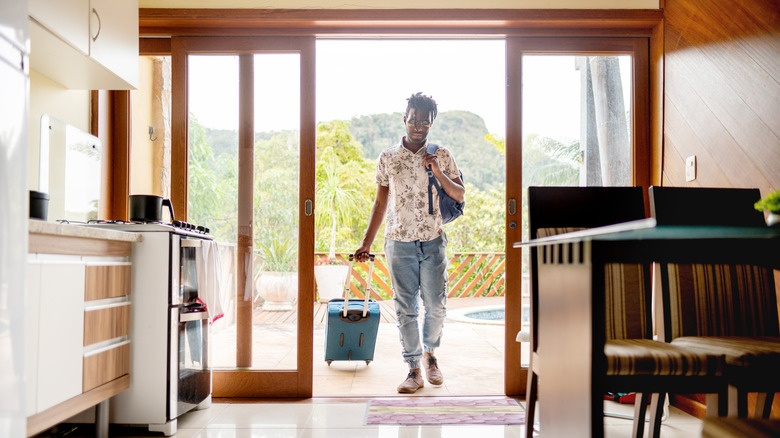The Most Important Thing You Need To Know Before Listing Your Home On Airbnb
Airbnb hosting has become a lucrative side hustle or full-time gig for many property owners. The platform has revolutionized the travel and tourism industry, with over five million hosts renting out their properties through Airbnb worldwide and an average income of $44,235 per year for U.S. hosts, per Thrillest. Since listing on Airbnb is free, and the platform handles all the transactions and provides host liability insurance, it seems like a no-brainer for property owners looking to generate income. But, before you turn your home into an Airbnb for a cool side gig, there are important things you should know before you list.
It's paramount to familiarize yourself with the local laws and regulations regarding short-term rentals, particularly for platforms like Airbnb. These regulations usually encompass a range of factors, including city council ordinances, permits, zoning codes, taxes, and other requirements. While it may require some effort, thoroughly researching your city's regulations before attempting to become an Airbnb host is imperative. Neglecting this step could potentially result in major complications, including cease-and-desist letters and significant fines and penalties. In New York City, illegally operating a short-term rental can cost you up to $5,000 per violation, and you'll be required to shut down the non-complying listing. Below, we show you how to ensure you can legally operate an Airbnb in your area and find all the regulations you need to set yourself up for Airbnb Superhost success.
Where to find local Airbnb laws and regulations
The frustrating part about making your home a vacation rental is dealing with your city's local regulations. Still, it's a necessary step you should take before stocking up on guest amenities and devising decor plans to impress guests. Luckily, Airbnb has compiled a list of general regulations to be aware of, as well as city-specific regulations. This is a great place to start. However, not every U.S. city is listed on its website, and the platform won't double-check that you comply with local regulations before your listing goes live.
Because the responsibility falls to you, it's best to contact your city or municipality city directly for a list of local laws and regulations. Some cities provide this information online, but others require a visit to an office. First, you'll want to find out if your property is in an area that allows Airbnb rentals, and then determine what's required to operate it and if any ancillary rules might affect your listing. In some major cities like Miami, operating an Airbnb is illegal and punishable by law. While there are still hosts that operate illegally and hope to skirt fines, this is a terrible business strategy that should be avoided at all costs. Some cities require you to acquire a permit, register your Airbnb, and pay hefty fees and taxes, so it's worthwhile to consult the city directly to get all the requirements, have your questions answered, and start the process.
Other important considerations
Legally renting your home on Airbnb can be a great source of income, but despite what you might think, it's not always passive income, and a lot of work is involved in getting your house ready to host. Although you're probably more excited about showcasing fun furniture and decor, budgeting, strategizing, and building a detailed listing are key to success. Once you've ensured that your plans for Airbnb hosting comply with local regulations, you'll want to set aside some time to calculate any startup costs and the ongoing monetary investment and time required for operating your Airbnb and then weigh that against your projected income. Budget for expenses like furniture, decor, cleaning fees, utilities, local taxes, and professional photography.
A savvy host will conduct market research, looking into other properties in the area to see what prices hosts are getting, how often bookings are full, and what kind of properties and decorative themes guests are most interested in. After budgeting your costs, you'll have a better idea of what you can spend to elevate the look of your Airbnb. Once designed, it's essential to compose a well-curated listing with a catchy title, detailed and accurate description, and eye-catching professional photos. For legal purposes, include any specific information your city requires, such as rental registration numbers, in the listing description. Since local regulations are constantly changing and being refined, you'll want to keep an eye on these even after your listing goes live.


